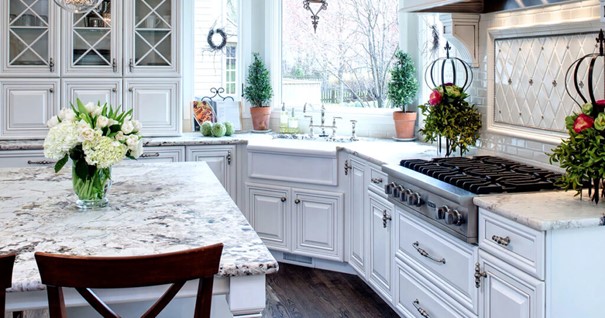Which is Better – Quartz Or Granite?
There are many pros and cons of quartz and granite. These differences include their cost, durability, and stain resistance. If you’re on a budget, quartz is definitely the better choice. Read on to learn more. Quartz is less porous and sturdier, so it can withstand more wear and tear.
Quartz is less porous
A quartz countertop is less porous than a granite countertop, so it requires less care and cleaning. It only requires soap and water for cleaning and does not require re-sealing. Unlike granite, which is porous, quartz will not stain, and if it gets wet, it will wipe right off. Unlike granite, quartz will not show stains or damage from high-impact items.
Another advantage of quartz is its variety of colors. It is available in a variety of shades and patterns. It is also more durable and stain-resistant than granite. It is also more flexible than granite when it comes to installation. However, it is important to note that quartz can discolor over time if it is exposed to direct sunlight.
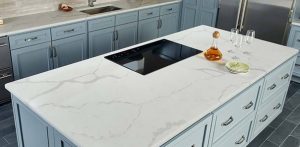
Quartz is also less porous than granite, making it a great choice for countertops in kitchens and bathrooms. Quartz is often used for countertops, flooring, and walls, as well as for stair steps and window sills. Because quartz is not porous, it won’t harbor bacteria. Hence, if you want a countertop that is stain-resistant and easy to clean, quartz is the perfect choice.
Because quartz is less porous than granite, it does not require sealing. It is also easy to clean, and is less likely to scratch. Its Mohs hardness rating is 7, making it more scratch-resistant than granite. It is available in more colors than granite, and it is more durable than granite.
Quartz is also less expensive than granite. It is generally available in almost any color imaginable. Compared to granite, quartz is the more durable and stylish countertop. Both types are durable and stylish, but each has their advantages and disadvantages.
Quartz is more durable
While both granite and quartz are extremely durable, the former is more scratch resistant than the latter. However, there are certain items that will stain quartz, including coffee and tea, paint thinners, and abrasive household cleaners. These materials contain small amounts of pigment or polyresin that can react with quartz’s surface. If a stain occurs, you should clean it immediately. A quartz countertop should not be left wet or exposed to heat.
Quartz is more durable than granite, according to the Mohs hardness scale. This scale was first invented by German scientist Friedrich Mohs in 1822. The scale ranks the hardness of minerals by their scratch resistance. Minerals ranked one are the softest, while minerals with 10 are the hardest. Quartz is ranked seven, making it one of the hardest materials for countertops.
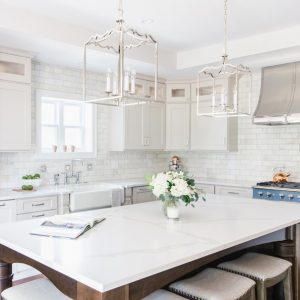
Both granite and quartz are durable and add value to your home. However, your choice should depend on the room that you plan to remodel. Whether you want a modern look for your kitchen, or something more traditional, choose the material based on its durability, maintenance, and appearance. Granite is still popular, and its natural beauty and unique appearance are appealing to many homeowners.
Both materials have pros and cons. Quartz is more durable and less susceptible to staining. The lighter patina of quartz will hide seams better than that of granite, which tends to show them off. However, there are a few caveats that come with both granite and quartz. You should always ask your fabricator about the durability of quartz if you are planning to install it outdoors.
Besides the floor, the kitchen countertop is the most used surface in the home. It is used for family meals, late-night snacks, school projects, and entertaining. Depending on your needs, you may live with your countertop for decades.
Quartz is more stain resistant
If you’re planning to install a new kitchen countertop, it’s important to understand how different quartz is from granite. Quartz is better for low-traffic areas of your home, like the kitchen. For areas where heat is a factor, granite is the better choice. The disadvantage of quartz is that it can scratch easily.
Quartz is a very hard material, which means it will quickly dull a knife. But this doesn’t mean that it can’t be cleaned. Granite is almost as scratch resistant as quartz, and you can also apply a stain-resistant sealer to prevent stains. But, you will need to clean quartz with mild cleansers. Granite can be ruined by harsh chemicals, so you need to be very careful when cleaning it.
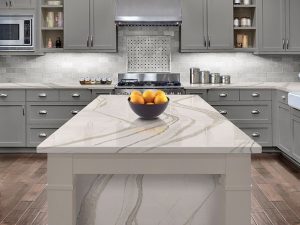
Quartz is also more durable. Unlike granite, quartz does not need annual re-sealing. In fact, quartz can even be cleaned with a simple damp cloth and warm water. However, it is still important to use caution when using hot appliances in the kitchen or hot hair tools in the bathroom. While quartz is more stain resistant than granite, it’s important to understand that both materials have different strengths and weaknesses.
Regardless of which material you choose, both granite and quartz countertops add value to your home. In addition to looking good, both materials are durable and easy to maintain. However, your final decision should depend on your personal preferences. If you’re planning to remodel your kitchen, choose quartz or granite for the feature worktop.
One of the most important reasons to choose natural stone over quartz is that it is 94% natural. Because quartz is created from crushed quartz, it is 94% natural. However, because it is processed extensively, quartz can lose the natural feel of natural stone.
Quartz is cheaper
Quartz is cheaper than granite, and it’s also greener. Many quartz countertops contain recycled content. The production process is much more environmentally friendly, too. While granite must be mined and transported around the world for its production, quartz is mined abroad and processed in the United States, making it a more sustainable choice for countertops.
It’s important to understand the cost of quartz versus granite before making a decision. Granite is naturally more expensive, and the cost of regular maintenance will add up over time. Quartz costs less and is more durable. Installation companies usually partner with one or more quartz suppliers. Quartz is a more durable material, and is cheaper than granite.
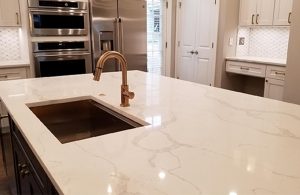
But there are a few downsides to using quartz. The color of quartz can change over time, and staining can be a problem. Quartz counters must be polished immediately to prevent staining. They’re not indestructible, and it’s best to avoid placing them directly under the sun. The sunlight can fade the color of quartz and cause the counter parts to separate. Luckily, there are darker slabs available to hide seams.
While both materials are durable and beautiful, they’re not inexpensive. Granite costs up to $200 per square foot, and even more for rare varieties. However, the quality of granite doesn’t depend on price. Quartz’s seams are less visible than those of granite, and it’s easier to conceal them with high-quality fabrication. However, the installation process can be a little more complicated. Quartz countertops are generally more expensive than granite, but they’re still more affordable than granite.
Another great advantage of quartz over granite is that it’s easier to maintain. While granite needs to be sealed annually, quartz can be cleaned with milder cleaning solutions. However, it’s important not to use harsh chemical products on quartz, as this can cause it to disintegrate.
Granite is more expensive
Granite is a natural stone that can come in a variety of colours. It is available in India, Brazil, China, and Spain, but the price of granite slabs made in these countries is much higher. This is due to the labor costs associated with manufacturing granite in China, which is a cheap source of stone. However, if you want to buy the best quality stone, granite slabs from Italy and Brazil will be more expensive than those from other countries.
Granite slabs are ideal for large counter tops. Typical slabs are about four to five feet wide and seven to nine feet long. Each slab is approximately one-fourth inch thick. These slabs are heavy, and require a significant amount of labor to lift and install them. This is why granite slabs should be installed by professionals. If you don’t have the time to do it yourself, consider hiring a contractor or supplier to install the granite slabs.

Granite is an extremely durable stone that comes in a variety of colors and patterns. It is also more expensive than other natural stones, and it requires periodic sealing. It’s also not waterproof, so liquids will soak into the stone. Because of this, granite countertops must be regularly sealed. In addition, granite countertops must be removed for regular sealing if they want to change color.
Granite countertops can cost anywhere from $40 per square foot to four to five hundred dollars a square foot. Additional costs include the cost of accessories like cutting boards, lazy susans, and kitchen sinks and vanity sinks, which can increase the overall cost of the project. Granite is also more expensive than other types of countertops, including butcher block and solid surface countertops.
By contacting Granite Expo, you can get detailed information about both granite kitchen countertops and quartz kitchen countertops.

